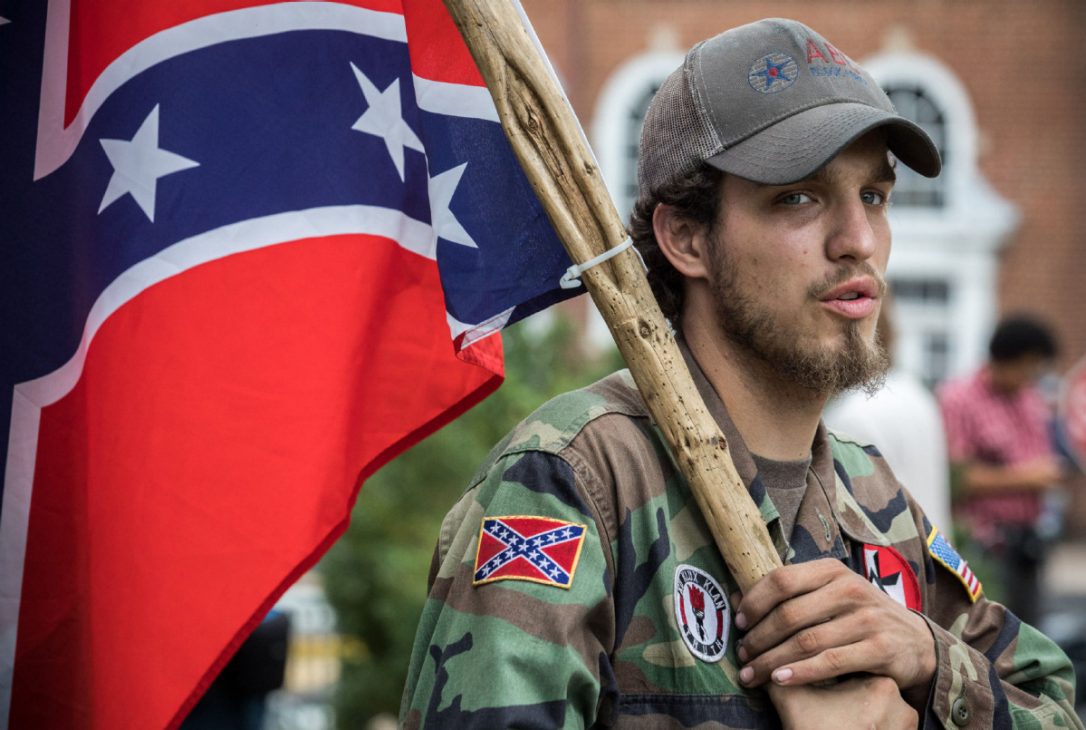Last night I stayed in a small town north of Boulder, Colorado. I fell asleep fast and slept soundly in the way one only does in the Rockies. That is, until around 1:00 AM when I was awakened by a series of dramatic explosions. The panic I felt was a sort of PTSD, which rivaled what I experienced during the fearsome Northridge earthquake of 1992. This early morning, the windows lit up, and the mountains roared with the sound of what seemed like artillery shells pounding against the mountains. I had no idea whether I was going to live or die. Lucky for me, it ended safely. It turned out to be nothing more than a transformer on a power line, which had blown up less than two hundred feet from my window.
A form of history-based PTSD may have played a part in the act of domestic terrorism in Charlottesville this past week, when a domestic terrorist rammed his car into a crowd of anti-white supremacist protestors, killing 32 year-old paralegal, Heather Heyer, and injuring 19 others. For most of us, the Civil War may seem like ancient history, but just because a war has been won, does not mean that a war has been concluded. Historically, the victor goes on to determine history and the loser, if not annihilated, goes into hiding. The events in Charlottesville remind us of the ugly truth that for some Americans, the Civil War has not concluded, and for the rest of us, a foe still lurks.
The statues of Confederate generals and politicians have as much place in the centers of American cities as those of Hitler, or Goebbels. It was the removal of one of them which set off the rampage, and it serves us well to remember that there are individuals who look at the monuments to Lee, and Jackson, and perhaps, even those to someone like the lesser-known Ben Tillman as tributes to heroes. In Tillman’s case, there is still an 8-foot-tall bronze statue outside the South Carolina statehouse memorializing him, along with a plaque praising his “life of service and achievement” as governor and U.S. senator. Tellingly, it makes no mention of the fact that he also hosted several lynching parties. To a certain group of individuals however, the removal of the statues also engenders a form a PTSD, as though the war and the horrors that were visited upon the South were happening all over again.
Some of the people who still pay homage to these men may be conflicted; they may be torn by the fact that their own kin served under them, that they died fighting for them, and that these leaders –who nearly all trained alongside Union generals –were also brave and in some ways honorable. But if they are conflicted, they should be.
The impetus for the Confederate army to disengage from the Union and go to arms against the federal government is often said to be about “state’s rights.” While this may be true, it is imperative to understand exactly what particular “right” the Confederacy had in mind; the right to enslave African American men, women, and children, to use the Bible to justify this unthinkably heinous conception, and to inflict miseries upon their fellow human beings such has the world has rarely seen.
Yes, those who praise the heroism of the Confederate leaders are indeed conflicted by this horrible fact. But for others perhaps, there is no such internal struggle; there is only a sense of having been defeated, having been humiliated on long-ago battlefields, and throughout the nearly 150 years since the end of the American Civil War –made to feel like exiles in their own country. It is for those individuals that the Civil War, which had indeed been won is, in their minds at least, not yet concluded. When we remove these statues, and again I firmly believe that justice, morality, and the needs of our nation going forward, demand that they must be removed, it is important to know that for some people, the act of removing them remains a deep affront to their very worldview.
In spite of what is commonly thought and said, our democracy is neither strong, nor is it necessarily resilient. It is by nature, fragile. I think of it less as stone, and more as gossamer. I fear that if we are not vigilant we could –God forbid –find ourselves in an instant, suffering as people do in Aleppo, Homs, and Hanna, and as we once did in Atlanta, Charleston, and Harrisburg.
Today, and for the foreseeable future, I will keep reminding myself that the sound of a transformer blowing up on a nearby power line, however frightening, is absolutely nothing compared to the sound and deadly shock of real artillery. We need to be aware that the events in Charlottesville are not merely about political differences, but in very real and terrifying ways, they represent a war, which has not been fully concluded.

Peter Himmelman is a Grammy and Emmy nominated rock and roll musician, visual artist, author, film composer, and speaker. Peter’s new book, Let Me Out (Unlock your creative mind and bring your ideas to life) is available here.

